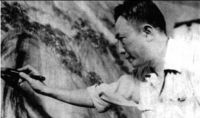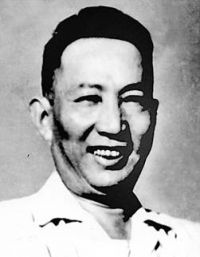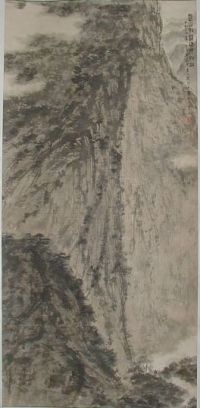Difference between revisions of "Fu Baoshi"
imported>Ciic |
imported>Ciic |
||
| Line 1: | Line 1: | ||
| − | [[File:Master Fu Baoshi at work, Asian Antiquities large-1-.jpeg|thumb|200px | + | [[File:Master Fu Baoshi at work, Asian Antiquities large-1-.jpeg|thumb|200px|Master Fu Baoshi at work]] |
[[File:Fu Baoshi.jpg|thumb|200px|Fu Baoshi]] | [[File:Fu Baoshi.jpg|thumb|200px|Fu Baoshi]] | ||
| − | [[File:Scholars in Landscape by Fu Baoshi, Asian Antiquities-1-.jpg|thumb|200px | + | [[File:Scholars in Landscape by Fu Baoshi, Asian Antiquities-1-.jpg|thumb|200px|Scholars in Landscape by Fu Baoshi]] |
| − | '''Fu Baoshi''' (''' 傅抱石''' ) was a great master of landscape painting in modern times. Fu worked with [[Guan Shanyue]] to paint the enormous landscape picture that hangs in the [[Great Hall of the People]], called [[Beautiful Landscape of the Motherland]]. | + | '''Fu Baoshi''' ('''傅抱石''') was a great master of landscape painting in modern times. Fu worked with [[Guan Shanyue]] to paint the enormous landscape picture that hangs in the [[Great Hall of the People]], called [[Beautiful Landscape of the Motherland]]. |
Fu was born into a poor family and worked as an apprentice in a china shop. He was later fired for being in ill-health. A master in a picture-mounting shop, surnamed Zuo, became Fu's first painting teacher. | Fu was born into a poor family and worked as an apprentice in a china shop. He was later fired for being in ill-health. A master in a picture-mounting shop, surnamed Zuo, became Fu's first painting teacher. | ||
Revision as of 10:53, 9 June 2017
Fu Baoshi (傅抱石) was a great master of landscape painting in modern times. Fu worked with Guan Shanyue to paint the enormous landscape picture that hangs in the Great Hall of the People, called Beautiful Landscape of the Motherland.
Fu was born into a poor family and worked as an apprentice in a china shop. He was later fired for being in ill-health. A master in a picture-mounting shop, surnamed Zuo, became Fu's first painting teacher.
With the help of famous Xu Beihong, the father of modern Chinese painting, Fu went to Japan to study the history of Oriental art at the Tokyo School of Fine Arts in 1933. He translated many books from Japanese and carried out his own research. He also brought Japanese visual elements to the Chinese ink painting tradition.
Fu carried out in-depth research into the history of landscape painting at the end of the 4th century BC. He worked very hard to imitate some masters' paintings of the Yuan Dynasty (1271-1368), Ming Dynasty (1368-1644), and Qing Dynasty (1644-1911), finally becoming one of the master painters of his age.
Fu was also a master of seal carving and once carved all 2,765 characters from the poem Lisao (Parting Sorrows) in a chicken-blood stone that was four square centimeters.


